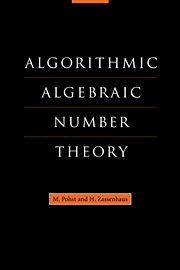Book contents
- Frontmatter
- Contents
- Preface
- Acknowledgements
- List of symbols used in the text
- 1 Basics of constructive algebraic number theory
- 2 The group of an equation
- 3 Methods from the geometry of numbers
- 4 Embedding of commutative orders into the maximal order
- 5 Units in algebraic number fields
- 6 The class group of algebraic number fields
- 7 Recent developments
- Appendix: Numerical tables
- Algorithms
- References
- Index
7 - Recent developments
Published online by Cambridge University Press: 03 May 2010
- Frontmatter
- Contents
- Preface
- Acknowledgements
- List of symbols used in the text
- 1 Basics of constructive algebraic number theory
- 2 The group of an equation
- 3 Methods from the geometry of numbers
- 4 Embedding of commutative orders into the maximal order
- 5 Units in algebraic number fields
- 6 The class group of algebraic number fields
- 7 Recent developments
- Appendix: Numerical tables
- Algorithms
- References
- Index
Summary
Introduction
Since the first printing of this book in 1989 algorithmic algebraic number theory has attracted rapidly increasing interest. This is documented, for example, by a regular meeting, ANTS (algebraic number theory symposium), every two years whose proceedings give a good survey about ongoing research. Also there are several computer algebra packages concentrating on number theoretical computations. At present the most prominent ones, which are available for free, are KANT, PARI and SIMATH. KANT comes with a data base for algebraic number fields, already containing more than a million fields of small degree. KANT is developed by the research group of the author at Berlin and will be presented in some detail in this chapter. We note that almost all of KANT and PARI is also contained in the MAGMA system.
In the sequel we shortly discuss the improvements which were obtained for the computation of the important invariants of algebraic number fields. On the other hand, in computational algebraic number theory the interest has gradually turned from absolute extensions to relative extensions of number fields and we will sketch the important developments in that area. If subfields exist, the information about the invariants of those subfields can be lifted and used in the field under consideration. This relative point of view permits computations in fields of much larger degrees and has important applications, for example to class field computations.
Information
- Type
- Chapter
- Information
- Algorithmic Algebraic Number Theory , pp. 427 - 458Publisher: Cambridge University PressPrint publication year: 1989
